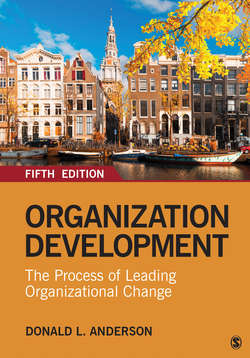Читать книгу Organization Development - Donald L. Anderson - Страница 43
На сайте Литреса книга снята с продажи.
Organizational Effectiveness and Employee Engagement
ОглавлениеMany practitioners are directing their attention toward conceiving of OD as organizational effectiveness, although the academic literature does not appear to be making this same shift. In some practitioner circles, organizational effectiveness is supplanting organization development as a preferred term, perhaps because of the continued perception today that OD is a “soft” practice not connected to the organization’s business objectives. It is not entirely clear whether in this new term organizational effectiveness differs substantially from OD as practitioners define it, though the former expression stresses the results the organization obtains from an intervention, but at the expense of the emphasis on personal and organizational growth that comes from the term development. The term organizational effectiveness is not a new one, clearly, as you will recall its inclusion in Beckhard’s (1969) well-known definition of organization development. Indeed, academic researchers have been working to define the characteristics, precursors, and determinants of OE for many years (see Cameron & Whetten, 1981). Many early studies of OE concentrated on quantitative and objective measures on outcomes of what constitutes an effective organization. Thus, by adopting this term and referencing this research history, we may be seeing a shift in the practitioner community away from the qualitative (interpersonal, cultural, growth, and learning) aspects of OD toward being able to quantitatively prove the value of an OD intervention.
To contrast with this organizationwide view of effectiveness, employee engagement is a second term that has been widely adopted by managers and OD practitioners. The term “refers to the individual’s involvement and satisfaction with as well as enthusiasm for work” (Harter, Schmidt, & Hayes, 2002, p. 269). Literature on an individual’s job satisfaction, productivity, and motivation is substantial. Some see engagement as a broader concept than these others, however, suggesting that “employees who know what is expected of them, who form strong relationships with co-workers and managers, or who in other ways experience meaning in their work, are engaged” (Luthans & Peterson, 2001, p. 378). The current interest in employee engagement may be reflective of a return to a concern with the health of the individual to complement the emphasis on organizational concerns and outcomes. Thus, the current reference to employee engagement may be a counter-response to the quantitative movement in organizational effectiveness, resurrecting what is lost by substituting the bottom-line business connotation of OE for OD. Today, the Gallup organization conducts a widely used employee engagement survey called the Q12.
